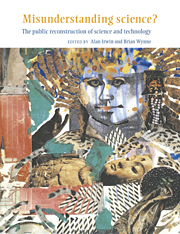Book contents
- Frontmatter
- Contents
- Acknowledgements
- Introduction
- 1 Misunderstood misunderstandings: social identities and public uptake of science
- 2 Science and Hell's kitchen: the local understanding of hazard issues
- 3 Disembodied knowledge? Making sense of medical science
- 4 Now you see it, now you don't: mediating science and managing uncertainty in reproductive medicine
- 5 Ignoring science: discourses of ignorance in the public understanding of science
- 6 Insiders and outsiders: identifying experts on home ground
- 7 Authorising science: public understanding of science in museums
- 8 Nature's advocates: putting science to work in environmental organisations
- 9 Proteins, plants, and currents: rediscovering science in Britain
- Conclusions
- Notes on contributors
- Select bibliography
- Index
Conclusions
Published online by Cambridge University Press: 16 October 2009
- Frontmatter
- Contents
- Acknowledgements
- Introduction
- 1 Misunderstood misunderstandings: social identities and public uptake of science
- 2 Science and Hell's kitchen: the local understanding of hazard issues
- 3 Disembodied knowledge? Making sense of medical science
- 4 Now you see it, now you don't: mediating science and managing uncertainty in reproductive medicine
- 5 Ignoring science: discourses of ignorance in the public understanding of science
- 6 Insiders and outsiders: identifying experts on home ground
- 7 Authorising science: public understanding of science in museums
- 8 Nature's advocates: putting science to work in environmental organisations
- 9 Proteins, plants, and currents: rediscovering science in Britain
- Conclusions
- Notes on contributors
- Select bibliography
- Index
Summary
The fieldwork presented in this volume provides mainly qualitative insights into the ways in which public groups attempt to fashion locally useful knowledges from ‘external’ and ‘indigenous’ sources. Most of the chapters analyse the interactions between identifiable social groups and scientific, technical or medical experts. These groups are defined by different parameters; geopolitical-cultural location (The Isle of Man); shared livelihood, culture, and physical place, but with more cultural permeability (Cumbrian sheep-farmers); physical location but a less-distinct culture (residents around major industrial hazard sites); shared experience of medical treatment – either chronic or episodic (hypercholesterolaemia and antenatal patients). Two further chapters analyse responses of more diffuse collectivities to scientific knowledges as experienced in museum exhibitions (Chapter Seven), and in relation to radiation hazards in the home (Chapter Five). Finally, and consistent with the orientation of the fieldwork chapters, two chapters examine new contexts of the contemporary negotiation of scientific practice (i.e. the norms and ethos of what is meant by ‘science’) – namely in environmental debate and policy-making, and in the commercialisation of scientific research.
In these conclusions, we offer some thoughts on the overall implications of this work by giving further reflection and clarification to some of the key themes of our book. Since two of the key assumptions about science which frame the ‘public understanding’ issue are its intrinsic usefulness and its universality, it is especially important to give attention to two issues at this stage: the connections between ‘useful knowledge’ and hidden models of social agency; and the relationships between the ‘local’ and the ‘cosmopolitan’ in the ‘micro social’ research presented here. Following this, we will consider some of the practical lessons which can be drawn from our collective research.
- Type
- Chapter
- Information
- Misunderstanding Science?The Public Reconstruction of Science and Technology, pp. 213 - 221Publisher: Cambridge University PressPrint publication year: 1996
- 8
- Cited by



